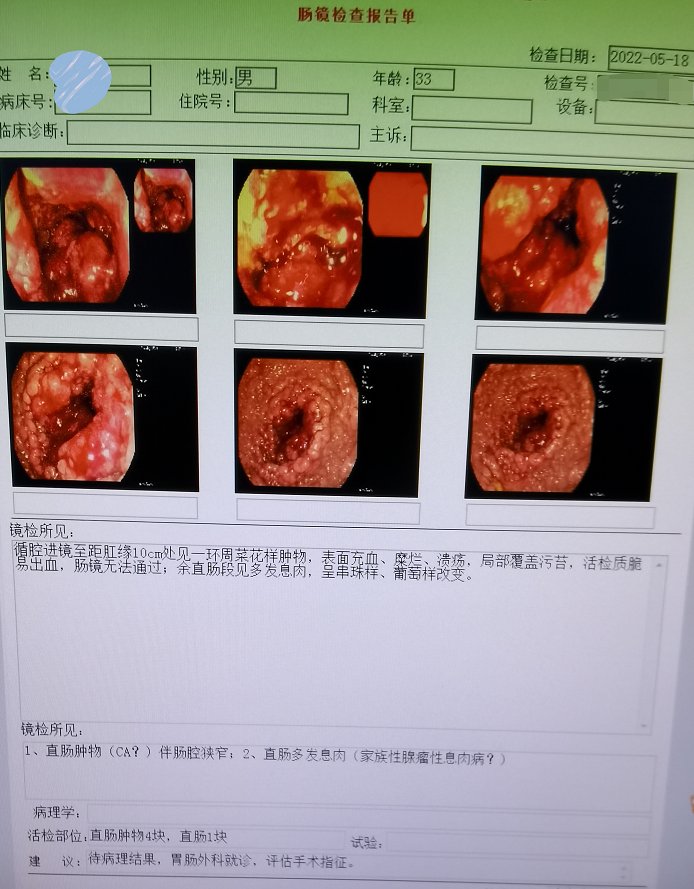Who would have thought that a 10-year-old child,
eat, drink and play normally,
Without symptoms,
inside The intestines are full of polyps.
And her brother in his twenties was also diagnosed with bowel cancer!


Fuzhou 20s Xiao Lin (pseudonym), never thought that at a young age, he went to the hospital for long-term poor bowel movements. Unexpectedly, after a colonoscopy, the intestines were actually covered with polyps. After further biopsy confirmation, he was diagnosed with familial adenomatous polyposis and has become cancerous.
Misfortunes do not come singly. Experts from the Third People’s Hospital Affiliated to Fujian University of Traditional Chinese Medicine asked for a detailed medical history and found that Xiaolin’s family also had a 10-year-old sister. Under the repeated reminders of the doctor, Xiaolin’s parents I also brought my sister for a screening colonoscopy.
As a result, there are usually no symptoms, and the lively younger sister also suffers from familial adenomatous polyposis, but it was discovered early, and there is no cancer.
Such cases are not uncommon. Shao Yanfeng, chief physician of the Department of Spleen and Stomach Diseases, said that familial adenomatous polyposis is an autosomal dominant genetic disease caused by the germline mutation of the APC gene, which accounts for about all colorectal cancers. 1% of cancer.

↑Yesterday, the hospital just found a 33-year-old young man suffering from familial adenomatous polyposis, intestinal lining. Full of polyps.
Thousands of spherical, hemispherical and pedunculated polyps are densely distributed in the colorectal lumen of these patients. The age of onset is very early, and clinical symptoms begin in puberty between the ages of 15 and 25. The common clinical manifestations are Bloody stools, diarrhea, and sometimes abdominal pain, mucus and bloody stools, and even anemia, intestinal obstruction, and perforation.
Untreated, almost 100% of these patients will develop bowel cancer after age 40.
Shao Yanfeng suggested:
Familial adenomatous polyposis is very heritable, siblings and children under the age of 40 who have been diagnosed with the disease in the immediate family are all Census objects: Before puberty, linked gene markers can be used to detect diseased gene carriers; asymptomatic individuals under the age of 40 can undergo electronic colonoscopy, and colonoscopy should be reviewed once a year.
For patients who have been identified as familial adenomatous polyposis, timely screening, early detection and early treatment are required. At present, such patients can undergo regular reexamination and timely removal of polyps under colonoscopy to prevent canceration.
Bowel cancer itself is not contagious, but it has a family clustering. A research team from Harvard University in the United States and Karolinska Institutet in Sweden found that people with a family history of polyps or colorectal cancer (here Refers to polyposis, i.e. young onset, dense polyps, and a high rate of malignancy), more likely to develop colorectal cancer than those without a family history of these;
and relatives with polyps or colorectal cancer The more relatives and the younger the relatives were diagnosed with polyps or colorectal cancer, the higher the risk of their own colorectal cancer, especially early-onset colorectal cancer (diagnosis age <50 years).
As long as 1 relative has polyps, the risk of colorectal cancer is 43% higher than that of people with no family history of polyps; if ≥2 relatives have polyps, the risk of colorectal cancer is further increased (79%).
The reasons can be summed up as follows:
①Family inheritance
Genetic factors are the primary cause of familial aggregation of intestinal polyps. reason.
②Same eating habits
A family eats mostly the same food every day. If there is a bad eating habit in the family, the risk of bowel polyps and even bowel cancer will increase in the whole family.
③Lifestyle affects each other
Inflammation is an important factor leading to the occurrence of intestinal polyps, and a bad lifestyle can cause inflammation in the body, such as long-term stress, anxiety and tension, staying up late , irregular diet, etc. The lifestyles of family members can easily influence each other. Affected by these bad living habits for a long time, family members are prone to suffer from the same diseases.
④Infection of Helicobacter pylori
Although this is not the main pathogenic factor, the infection of Helicobacter pylori can also induce the occurrence of colorectal polyps. Helicobacter pylori can be transmitted through shared meals. If the family’s dietary hygiene is not good enough, one person can be infected, and others can easily be infected.
Therefore,
people with a family history of bowel cancer or polyps,
family members should also be very careful,
bad changes Lifestyle habits, regular screening.
For more intestinal health knowledge, pay attention to the [Intestinal Peace of Mind] column
Fujian Health News All Media Reporter: Liu Weifang
Editor: Xiaofeng
< p> Review: Huang Meihui, Zhu Xiaojie
